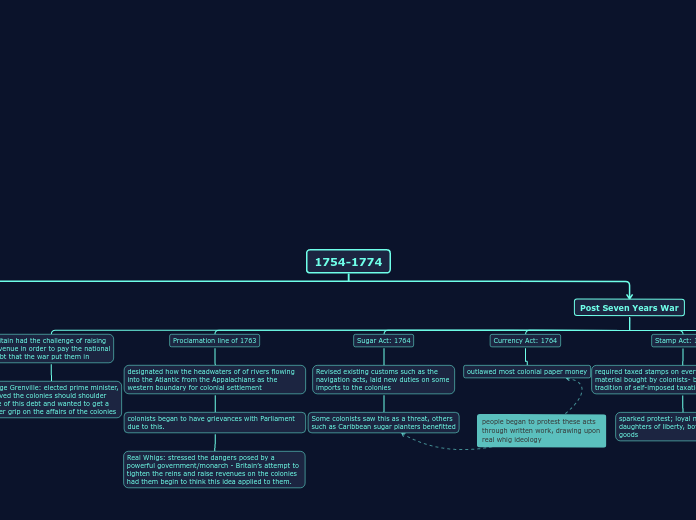1754-1774
7 Years War 1756-1763
Albany Congress: 1754
25 delegates from each colony
and over 200 delegates from
native tribes gathered to To forge a stronger alliance with the Iroquois
Coordinate plans for intercolonial defense
Fighting over the Ohio Valley
French Settlers
Ohio Company
Native tribes
Treaty of Paris; 1763
declared the war over
Result; Britain took Quebec and ousted the French from the continent
The Natives now find that their long-used tactics of setting foreign powers against each other is now useless
Post Seven Years War
Britain had the challenge of raising
revenue in order to pay the national
debt that the war put them in
George Grenville: elected prime minister,
believed the colonies should shoulder
some of this debt and wanted to get a
tighter grip on the affairs of the colonies
Proclamation line of 1763
designated how the headwaters of of rivers flowing into the Atlantic from the Appalachians as the western boundary for colonial settlement
colonists began to have grievances with Parliament due to this.
Real Whigs: stressed the dangers posed by a powerful government/monarch - Britain’s attempt to tighten the reins and raise revenues on the colonies had them begin to think this idea applied to them.
Sugar Act: 1764
Revised existing customs such as the
navigation acts, laid new duties on some
imports to the colonies
Some colonists saw this as a threat, others
such as Caribbean sugar planters benefitted
Currency Act: 1764
outlawed most colonial paper money
Stamp Act: 1764
required taxed stamps on every piece of printed material bought by colonists- broke the colonial tradition of self-imposed taxation
sparked protest; loyal nine, sons and
daughters of liberty, boycotting British
goods
Townshend Acts: 1767
Duties proposed by Charles Townshend on trade goods like paper, glass tea, etc
Boston Massacre, 1770: confrontation in Boston between British troops and Boston civilians that led to the death of 5 civilians
Tea Act: 1773
tea would be sold in America only by agents of the East india company
The idea that this was a method of parliamentary
control became exceedingly popular
Boston tea party - men dumped british tea into the harbor while dressed as natives
Intolerable Acts: 1774
punishment for the Boston tea Party;
closed trade harbors until the citizens
paid debt
Quebec Act:1774
intended to ease strains that had arisen since the British conquest of the formerly french colony of Quebec
